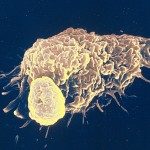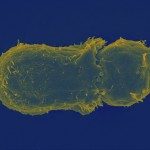Lien vers Pubmed [PMID] – 7737670
Hybridoma 1994 Dec;13(6):457-68
We produced polyclonal and monoclonal antibodies (MAbs) against recombinant human (rh) granulocyte-macrophage colony-stimulating factor (GM-CSF) and performed studies of epitope mapping by ELISA, using five synthetic peptides corresponding to sequences along this molecule. Additionally, anti-peptide MAbs were generated. The antibody ability to inhibit rhGM-CSF activity was determined using as bioassay the MO7e cell line, which is dependent on hGM-CSF for growth in vitro. An immunodominant epitope able to induce the highest neutralization antibody titers was identified near the N terminus of hGM-CSF. A synthetic peptide 14-24, homologous to a sequence including part of the first alpha-helix of the molecule, was recognized by neutralizing anti-protein antibodies. Similarly, MAbs anti- 14-24 cross-reacted with rhGM-CSF and specifically blocked its function. Replacement of Val16 or Asn17 with alanine greatly reduced the antibody-binding capacity to peptide 14-24, whereas substitution of Gln20 or Glu21 was less critical. Monoclonal antibodies generated against residues 30-41 (corresponding to an intrahelical loop) and 79-91 (homologous to a sequence including part of the third alpha-helix) or its analog [Ala88](79-91)beta Ala-Cys, were conformation dependent and nonneutralizing: they failed to react or bound poorly to rhGM-CSF in ELISA, but readily recognized the homologous sequence in the denatured protein, by Western blotting.


